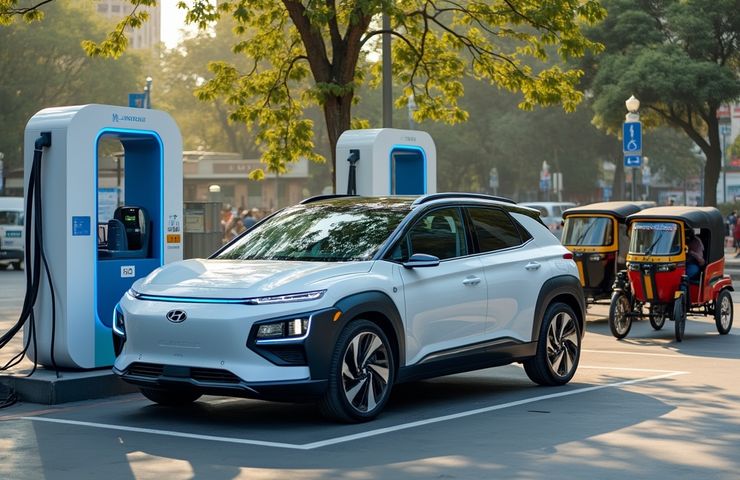Hydrogen Revolution in Delhi NCR: Paving the Way for Zero-Emission Mobility
Key Ideas
- Hyundai and Indian Oil initiated real-world trials of Hyundai’s NEXO FCEV in Delhi NCR, aiming to test hydrogen mobility within the challenging urban environment.
- The project showcases the potential of hydrogen fuel cell technology and the importance of developing the necessary infrastructure for a sustainable and zero-emission transport future.
- The partnership between Hyundai and Indian Oil signifies a strategic move towards embracing clean energy solutions, potentially leading to significant investments in hydrogen mobility and green technology in India.
- With the global momentum towards sustainable energy sources, the success of these trials could position Delhi NCR as a pioneer in hydrogen-powered transportation, setting a benchmark for other regions worldwide.
Hyundai Motor Company and Indian Oil Corporation have joined forces to revolutionize clean transportation in India, particularly in the bustling streets of Delhi NCR. The collaboration kicked off hydrogen mobility trials in 2024, deploying Hyundai's NEXO fuel cell electric vehicle (FCEV) to navigate the challenging urban environment. This initiative aims not only to showcase cutting-edge technology but also to pave the way for a zero-emission future powered by hydrogen fuel cells. Delhi NCR, known for its severe air quality issues and dense population, serves as a fitting testbed for hydrogen technology, with the potential to demonstrate its viability on a large scale.
At the core of the project is Hyundai's NEXO FCEV, a futuristic SUV capable of traveling over 600 km on a single hydrogen refill, emitting only water vapor. The vehicle's hydrogen fuel cell converts hydrogen and oxygen into electricity, presenting a promising solution for sustainable urban transportation. Indian Oil's commitment to establishing hydrogen refueling stations further supports this endeavor, laying the groundwork for a broader adoption of hydrogen-powered vehicles across India.
The partnership between Hyundai and Indian Oil signifies not only a technological advancement but also a strategic move towards sustainable energy solutions. Success in these trials could lead to substantial investments in hydrogen mobility, fostering green technology development and creating new job opportunities. Moreover, the initiative aligns with India's push for sustainable energy, as evidenced by initiatives like the National Hydrogen Mission.
As the world transitions towards cleaner energy sources, the potential success of the Delhi NCR trials could propel the region to become a frontrunner in hydrogen-powered transportation, setting an example for global adoption. By addressing key factors like fuel cell durability, weather impact, and cost efficiency, these trials aim to establish a robust hydrogen transport network in India. With hydrogen emerging as a pivotal player in the sustainable energy landscape, the collaboration between Hyundai and Indian Oil signals a significant step towards a greener and more environmentally conscious future.
Topics
Cities
Environmental Impact
Infrastructure
Sustainable Energy
Economic Development
Fuel Cell Technology
Partnership
Government Initiatives
Clean Transportation
Latest News
